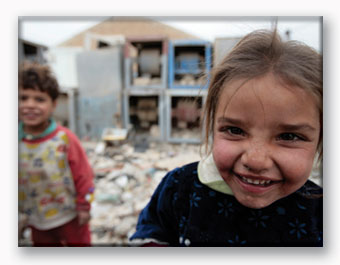Iraqis are on the move away from their broken nation. Who will be responsible for them?
In the buildup to the Iraq invasion, then Secretary of State Colin Powell defined the “Pottery Barn” principle for President Bush in an attempt to highlight the seriousness of the military adventure being contemplating. “You break it, you own it,” Powell told the president.
Five years later Iraq looks pretty broken, and while the United States ponders the fiscal and logistical challenge of “owning” Iraq’s political culture and ravaged infrastructure, one element of America’s Pottery Barnish possession of Iraq’s many ills is consistently overlooked. Who should bear the burden of caring for the millions of Iraqis already displaced or threatened to be displaced by the ongoing mayhem?
According to the International Organization for Migration, almost 5 million Iraqis have fled the violence since 2003. More than 2.4 million abandoned their homes for safer areas within Iraq; 1.5 million are now living in Syria; and another 1 million refugees have fled to Jordan, Iran, Egypt, Lebanon, Turkey, and the Gulf States. Few of these war migrants consider returning to Iraq an option.
Iraq’s refugees represent an entirely new phenomenon in the annals of international refugee crises. These displaced people are frequently departing from well-established Second World, middle class communities and diffusing into urban communities throughout the Middle East. They are not concentrating themselves in “normal,” easy-to-administer refugee camps where relief agencies can reach them, survey their needs, and track their whereabouts and circumstances.
Most Iraqis in these other Middle Eastern nations have been classified by their host nations as “guests,” avoiding the additional social burden that refugee status would demand from host countries but leaving Iraqis with a dubious legal status, unable to apply for aid or to accept employment. Many are simply exhausting whatever resources they were able to take with them when they fled Iraq.
The enormity of the crisis threatens to overwhelm the poorly financed and equipped social services of Iraq’s neighboring states, and the restive presence of this increasingly discontent and ignored community can only further destabilize an already troubled region.
Syria ended its open-door policy last October and imposed visa restrictions on Iraqi refugees. Egypt hosts 130,000 Iraqis but has closed its borders to additional “guests.” In Jordan, where 70 percent of the population is of Palestinian-refugee origin, Iraqis have to pay for basic services, and in Lebanon Iraqis live as outlaws, according to Refugees International, hiding from arrest, detention, and even deportation.
How has the United States responded to the humanitarian disaster that is emerging from its preferential option for war? Fewer than 7,000 Iraqi refugees have been resettled here since 2003, and the State Department did not meet a quota of 7,000 refugee admissions for 2007, ultimately resettling only 1,608 Iraqis. It is far off the goal of 12,000 resettlements by September 2008, with only 4,742 admitted by June. Such figures, at any rate, pale besides the reality of millions of Iraqis seeking asylum from the violence which has enveloped their society.
he Iraqi crisis comes at a difficult time for refugees worldwide regardless of their origin. Anti-immigrant sentiment is on the rise, and national economies are weakening. The fear of terrorist infiltration has further diminished the willingness of host nations to accept Iraqis while escalating security measures aimed at preventing such infiltration have encumbered an already complicated screening process.
Certainly the Iraqi government, with more oil money suddenly on its hands than it knows what to do with, needs to do more for its own people. But as the major authors of this crisis, we Americans also need to step up with higher quotas for Iraq, a more streamlined processing protocol, and more money for relocation and support for the waves Iraqi refugees who should be coming to America.
We broke it; we bought it. Now it’s time to pay up.















Add comment